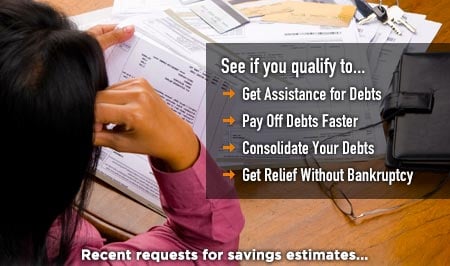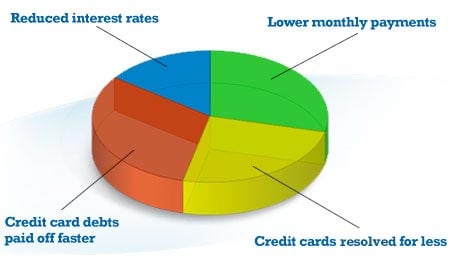
Debt Management Program
If you are struggling just to make ends meet and in need of relief from credit cards and other debts, don't despair, because you're not alone and maybe a debt management program can help you. These days, many residents in Florida and elsewhere are also looking for proven and viable ways to find debt relief from credit card debts as well as unsecured debts like medical bills, department store charges, or even utilities.
See how debt relief can help you. Answer a few, simple questions to get a free debt relief estimate and savings analysis - at no cost to you.
The good news is, there are a number of options and debt-relief services designed to help you manage, control, and finally, pay down your debts. For some people, debt-relief may be in the form of a debt management program (DMP), or what's also known as debt consolidation. With a debt management program, you will typically work with a credit counseling company that will perform a thorough review of your finances, and then make make proposals on your behalf with your creditors requesting reduced interest rates, eliminate finance charges and late fees, or lower your monthly payments -- once your management plan is in place.
Generally, your credit counselor can customize a debt relief program or plan that will make it easier for you to pay down all your debts at a lower interest rate and with an amount that you can realistically afford each month. Under debt management programs, your unsecured debts will typically be consolidated into one monthly payment per month that will be made to the credit counseling agency that, in turn, will distribute payments on your behalf to various creditors based on the payment plan they have worked out with each creditor.
Debt Settlement: Another Option
Aside from debt management companies, there are agencies and organizations offering debt settlement programs, which generally mean credit companies may agree to "forgive" your debt for a much lesser amount than you actually owed. Under a debt settlement program, in exchange for a one-time, lump sum payment (the settlement), your creditor may agree to forgive the remainder of your debt, and report it to the credit bureaus as settled.
It's important to consider some of the terms that may be involved under a debt settlement program so you don't end up in worse financial shape than when you started. First, some consumers may stop making payments to their creditors and put some money aside towards paying off the settlement. During this period when they are saving up funds and not making their payments, they are, essentially, in default of their credit card agreements--putting them at risk for being sued by creditors. In addition, debt settlement clients typically see a decline in their credit scores, particularly if they had good or excellent credit prior to the settlement. But, in spite of the risks, many consumers have made debt settlement a popular alternative to bankruptcy--which has a more damaging and longer lasting negative impact on one's credit score.
Tools to Help You Manage Debts
As you may have noticed, there is a wide variety of services and solutions designed to help you manage, reduce, and ultimately, eliminate your debts. The more you understand what your debt-relief options are and the money-saving benefits each one may provide, the sooner you will find relief from your nagging credit card debts. In addition, there are software programs designed specifically for those who may want to rely on digital tools to help them gain more control over their finances. Typically referred to as debt management software, many of these programs let you enter your sources of income, your expenses, and your total debt, and then help you track how long it might take for you to pay it all off.
Explore your debt relief options. Request a free debt relief estimate and savings analysis, at no obligation to you.





















